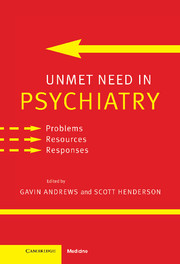Book contents
- Frontmatter
- Contents
- List of Contributors
- Preface
- Part I Unmet need: defining the problem
- Part II Unmet need: general problems and solutions
- Part III Unmet need: people with specific disorders
- Part IV Unmet need: specific issues
- Part V Unmet need: conclusion
- 29 A personal overview
- 30 Conclusion: the central issues
- Index
29 - A personal overview
from Part V - Unmet need: conclusion
Published online by Cambridge University Press: 21 August 2009
- Frontmatter
- Contents
- List of Contributors
- Preface
- Part I Unmet need: defining the problem
- Part II Unmet need: general problems and solutions
- Part III Unmet need: people with specific disorders
- Part IV Unmet need: specific issues
- Part V Unmet need: conclusion
- 29 A personal overview
- 30 Conclusion: the central issues
- Index
Summary
You will have read in the preceding chapters about the problems facing those who attempt to provide health and social services to older and younger people, the special problems of primary care, and the particular problems in developed and in deprived countries. From these chapters, strong messages emerge that are relevant to the questions posed in other parts of this book.
First, there is likely to be a rapid increase in the prevalence of certain diseases soon, for example dementia. Second, there is still a massive unmet need for treatment amongst sufferers of treatable diseases everywhere, but especially in developing countries. Third, the principal problem is a shortage of money and human resources: too little money to treat everyone whom the services consider should be treated, or would benefit from treatment; and too few trained staff to undertake the treatment, should it be available. We should recognize that part of that shortage of human resources is because professionals have approved long and expensive training programs for their students who, in consequence, are expensive to employ. Some, it has to be said, use their time in a manner inappropriate to their training. For example, does a doctor, in cash-limited times, have to be trained in anatomy, physiology, biochemistry, and the physical signs of inguinal hernia to practise psychotherapy? I doubt it.
Psychiatrists have long believed that part of the problem of their overburden exists because primary care physicians persist in doing a poor job. Primary care physicians appear either not to recognize mental illness or, if they do, not to treat it well.
Keywords
- Type
- Chapter
- Information
- Unmet Need in PsychiatryProblems, Resources, Responses, pp. 417 - 421Publisher: Cambridge University PressPrint publication year: 2000

